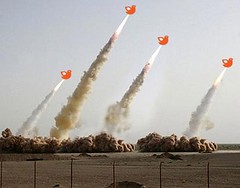 Image by Zoolcar9 via Flickr
Image by Zoolcar9 via Flickr
It's interesting at this point to turn the clock back to the past and ask how we got here. This isn't the first time that political turmoil has changed the way we get our news. Back in the '90s CNN rose to prominence in part because of its coverage of the fall of the Soviet Union and 24/7 cable TV news became the dominant news medium. Before that television replaced radio and and radio replaced newspapers. Note that all along the line, each medium "replaced" the one before it in only the broadest possible sense. Newspapers while they are struggling to survive today, still continue to publish. Similarly, radio continues to be a powerful medium even if it has been replaced in terms of influence by television. And more people was the network evening news that cable TV news. So now that the Internet is replacing other media as the dominant source for news it's in parts because we have been linking to New York Times articles and MSNBC video and Twittering about stories we've seen on television.
Think of information as a sphere that surrounds you. As communication technology advances, that sphere expands and fills up with sources of information that we can use to access it. But until the Internet, there was nothing to hold it all together. The Internet acts a glue that helps its users hold on to information. It's no wonder the mainstream media is struggling to integrate itself with Internet services like Twitter, sometimes with embarassing results.
No comments:
Post a Comment